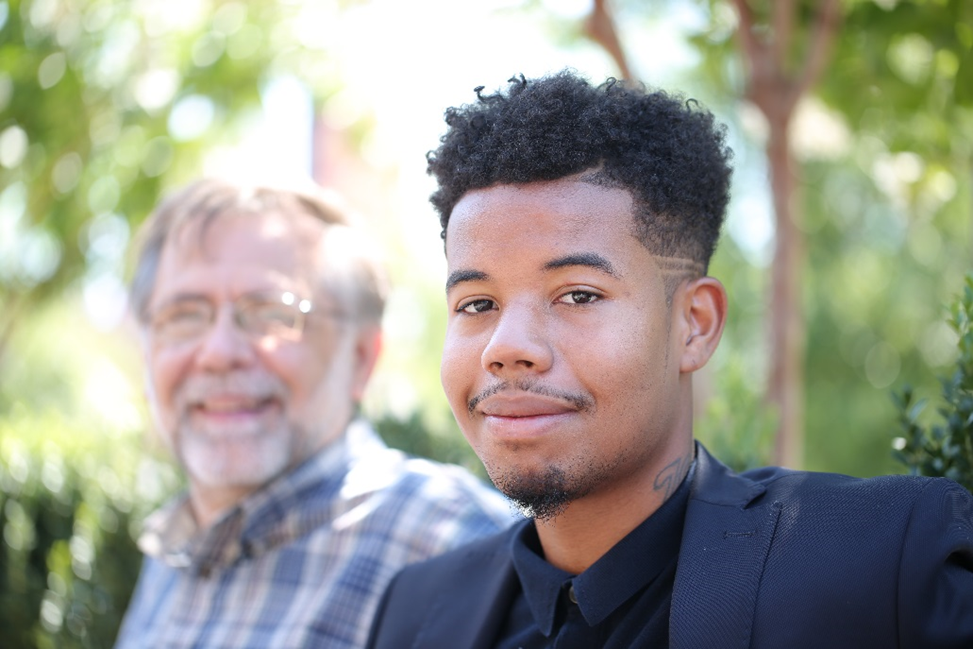Our very first mentee, Michael, was matched in our program in 2005. He entered into foster care at the hospital on the day he was born, and aged out of care on his 21st birthday. Throughout those 21 years, he was in and out of foster homes, lived off and on with different relatives, and experienced homelessness as a teenager. He constantly faced instability because of his time in the foster care system.
One day Michael, who had just recently aged out of care, called us at BEST Kids in a lot of pain. He had injured his shoulder at work, and after spending the entire day in urgent care, the doctors wouldn’t prescribe him any pain medication or offer him any relief. I went to meet Michael outside his apartment, and while he was calm and in stable condition, he was still in a lot of physical pain. I decided to ride in the ambulance with him to help him get his shoulder checked out at the hospital.
At the emergency room reception desk, they ran through all the routine questions with Michael: his name, insurance, address, etc. I’ll never forget what happened next: they asked him for his emergency contact information. His face dropped and he fell silent. Upon seeing the look on his face, my heart dropped as I saw him struggling to think of a family member or friend in his life that he could list. After about 10 seconds of visual and nearly palpable hopelessness, his face perked up a bit and he spurted out, “My mentor, Lyle.”
Those 10 seconds were an emotional roller coaster for me. To see Michael have to vocalize that he did not have someone to call on in emergencies broke my heart. It opened my eyes to just how difficult that realization is for our youth in so many everyday situations. But the fact that he had a mentor, and that he felt he could count on his mentor during an emergency, gave him hope and reaffirmed for me that the work we are doing is powerful and imperative.

We hear about the challenges youth in foster care, like Michael, face all over the country. These stories and statistics undoubtedly demonstrate the need for increased resources to help these youth succeed, and the various ways in which we as individuals and communities can support this particularly resilient, yet vulnerable population.
This is where BEST Kids one-on-one mentoring program comes in. Experiences for youth during their time in foster care are quite different. Some youth come into care at birth and spend the entirety of their young lives as wards of the state, while others spend just a few months in care while systems of support are put into place for families. Some youth come into care because of various forms of abuse, while others experience some form of neglect or a tragic occurrence. Youth in foster care experience so many adults and service providers constantly coming in and out of their lives, most of which are paid to do so. Besides voluntarily giving of their time, what makes mentors any different?
Mentors open up opportunities and provide assistance, but aren’t social workers. Mentors are listening ears that aren’t therapists. They inspire a love for learning, but aren’t teachers, and they motivate and encourage, but aren’t coaches. They guide and support, but aren’t parents. Above all else, mentors are there consistently and voluntarily, as they cater to the individual needs of the youth, including creating space for our youth to be kids and have lots of fun.
Lyle has supported Michael as a mentor for over 10 years now. Throughout the years, they participated in many activities like biking, canoeing, picnics and ballgames. Lyle also practiced interviewing skills and supported Michael when he got his first job. He helped Michael get his first apartment and taught him how to fix a few things around the house. Lyle most recently mentored Michael as a new father to a beautiful little girl.
Lyle didn’t swoop in and make Michael’s life perfect or heal all of his trauma; and as a mentor, he was never expected to do so. We train and individually support our mentors to simply spend time with their mentees consistently, to care for them, and help them to keep the hope they need to become successful adults, while overcoming obstacles youth face together.
I urge you to learn about the various ways you can support youth in foster care in your community. There is an ever present need for foster homes throughout the country. You can volunteer with or mentor with organizations that help youth in foster care to thrive, or you can advocate for systemic change to improve services impacting youth in care.
BEST Kids is a nonprofit organization that provides one-on-one mentoring for over 150 youth in foster care in the Washington DC Metro area. We match caring and consistent adult mentors with youth to provide them not only the guidance and support they need to grow up, but also to help them navigate challenges specific to growing up in foster care.
Written by Krislyn Mossman, Executive Director of BEST Kids
